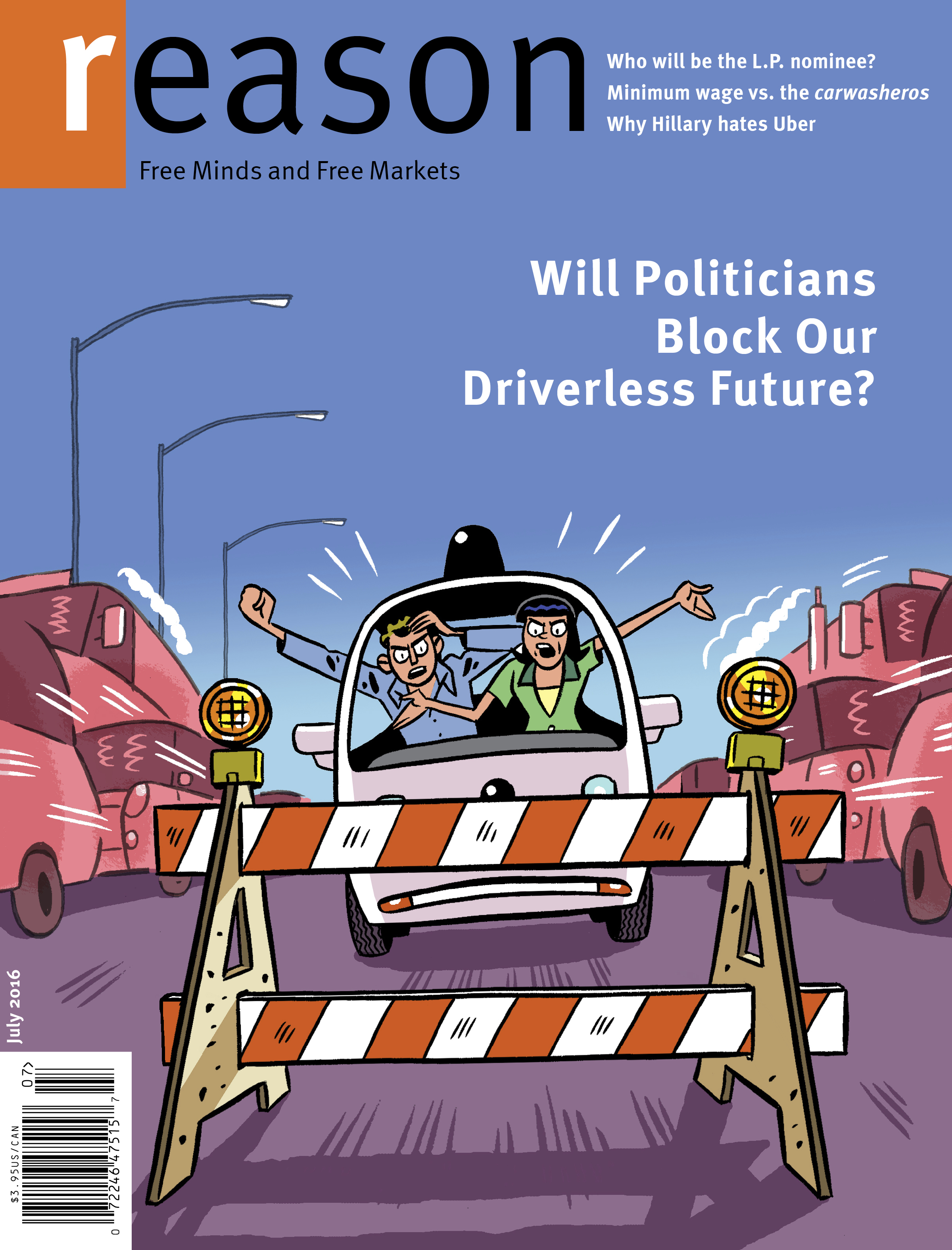Feds Want to Support Automated Cars. Oh, Also: They Want Much More Regulatory Authority.
Innovation is an opportunity for some to expand government power.


The good news is that the federal government genuinely does want self-driving or automated vehicles to happen. Credit a heavily technocratic Obama administration that loves the idea of replacing the poor choices of feckless citizens with smooth, sleek algorithms.
Today, the National Highway Traffic Safety Administration (NHTSA) released a 116-page report detailing how it plans to regulate the introduction of these cars, which they're calling "highly automated vehicles," or HAVs. So we can have a debate over whether it should be legal to allow HAVs to drive in HOV (high-occupancy vehicle) lanes.
The administration wants these cars on the road, but on its own terms. President Barack Obama makes it clear in a guest commentary over at the Pittsburgh Post-Gazette, where HAVs are now being tested on the road. He also makes it clear that the federal government will be deciding what is and isn't safe. Obama and the NHTSA are your parents watching you do a wacky chemistry experiment for a science fair project making sure you don't mix the wrong things together:
Regulation can go too far. Government sometimes gets it wrong when it comes to rapidly changing technologies. That's why this new policy is flexible and designed to evolve with new advances.
There are always those who argue that government should stay out of free enterprise entirely, but I think most Americans would agree we still need rules to keep our air and water clean, and our food and medicine safe. That's the general principle here. What's more, the quickest way to slam the brakes on innovation is for the public to lose confidence in the safety of new technologies.
Both government and industry have a responsibility to make sure that doesn't happen. And make no mistake: If a self-driving car isn't safe, we have the authority to pull it off the road. We won't hesitate to protect the American public's safety.
To be completely clear, "For [the Department of Transportation], the excitement around highly automated vehicles (HAVs) starts with safety," is a sentence somebody actually wrote with complete sincerity in the executive summary of the report.
Much of the report is technical, dry, and about figuring out how HAV regulations fit within existing federal framework. That is very nearly praise, given the much worse potential alternatives. The NHTSA is providing guidance to the states in the report, trying to separate what the federal government wants to control (establishing vehicle safety standards, managing recalls, issuing guidance to manufacturers) and what it wants to leave to the states (licensing drivers, enforcing traffic laws, managing safety inspections and liability rules)
Essentially it's similar to the separation of authorities over vehicles right now, but what they're trying to do is prevent individual states (and cities) from creating their own rules about what an HAV must have or do in order to be allowed on the road. It's one thing to have different speed limits from state to state; it's something else entirely if it's illegal for the vehicle you're in to be on the road in some states but not others. That's exactly what has happened in some states when lawmakers passed their own regulations.
But despite the emphasis on making way for innovation and experimentation, make no mistake: The NHTSA is also using the development of HAVs to lobby for more regulatory authority. Buried deeper into the report, after outlining the various processes for car manufacturers to get their vehicles approved, are requests for additional authority to control the process. One of those authorities they're asking for is pre-market approval of new vehicle types and technologies. Read this section and suddenly you might hear the sound of screeching tires in your head:
NHTSA adoption of a full pre-market approval approach for HAVs would entail replacing the self-certification process with at least two new statutory provisions. The first provision would prohibit the manufacture, introduction into commerce, offer for sale and sale of HAVs unless, prior to such actions, NHTSA has assessed the safety of the vehicle's performance and approved the vehicle. …
Substitution of pre-market approval for all standards for which manufacturers currently self-certify would be a wholesale structural change in the way NHTSA regulates motor vehicle safety and would require both fundamental statutory changes and a large increase in Agency resources.
A massive increase in Agency resources, you say? No kidding. The NHTSA uses the Federal Aviation Administration's (FAA) guidelines on drones as an example of how other agencies have this kind of pre-market approval authorities they're looking for. The problem with that example is that the FAA was absurdly slow to respond to the development of drones and attempted to block their private use entirely, an order most people ignored. And then the rules they put into place were absurdly broad in scope and discouraged innovation. The last place we should be looking for guidance for pre-market approval is the FAA.
Really, is there a government agency that has market approval authority that hasn't been awful at its job? We just had a massive hubbub over the high prices of EpiPens to halt allergic reactions. The manufacturer of that medicine is able to charge ridiculous prices entirely because the Food and Drug Administration is standing in the way of competition. Given that autonomous vehicles make people pretty nervous at the moment, there is likely going to be pressure on regulators to tip the scale heavily into "precautionary principle" territory and veto stuff that probably doesn't need to be vetoed.
So, while it's great that the administration is openly declaring support for automated vehicles, this push in the report for more regulatory authority should be a big warning flag.
For more about the government's meddling in automated vehicles, read Ron Bailey's cover story for Reason Magazine from July.


Show Comments (68)